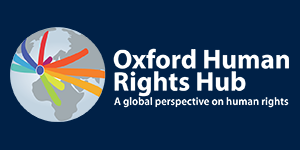Spotlight on….Professor Sandy Fredman, Director of the Oxford Human Rights Hub
 Sandra Fredman’s research has always focussed on the ways in which the law addresses imbalances in social power, particularly in the fields of equality, human rights and labour law. Her work on equality began with her book Women and the Law (OUP, 1997) which develops a critical framework for understanding the meaning of equality and the limits of the law in achieving equality for women. She has continued to develop an analytic framework on the right to equality in many peer-reviewed papers, as well as her book on Discrimination Law for the Clarendon Series (2nd ed, 2011, OUP). Discrimination Law has been cited in court decisions and translated into a number of several languages including Chinese. Particularly important in the development of the analytic framework on the right to equality was a report she was commissioned to write for the Equal Opportunities Commission in 2002. In this report, she developed a four dimensional analytic framework on equality, based on wide-ranging discussions with stakeholders, practitioners and academics. Rather than attempt to reduce the right to equality to a single concept, such as equality of opportunity or results, this framework sees the aim of the right to equality as simultaneously redressing disadvantage, addressing stigma, stereotyping and violence; facilitating voice and participation; and valuing difference through achieving structural change. This framework has been increasingly influential. It was incorporated in a modified form into the Equality Act 2010; and used to develop the conception of inclusive equality by the UN Committee on the Rights of People with Disabilities. It has been cited by the Supreme Court of India, and used to define equality in the Abidjan Principles on the Right to Education.
Sandra Fredman’s research has always focussed on the ways in which the law addresses imbalances in social power, particularly in the fields of equality, human rights and labour law. Her work on equality began with her book Women and the Law (OUP, 1997) which develops a critical framework for understanding the meaning of equality and the limits of the law in achieving equality for women. She has continued to develop an analytic framework on the right to equality in many peer-reviewed papers, as well as her book on Discrimination Law for the Clarendon Series (2nd ed, 2011, OUP). Discrimination Law has been cited in court decisions and translated into a number of several languages including Chinese. Particularly important in the development of the analytic framework on the right to equality was a report she was commissioned to write for the Equal Opportunities Commission in 2002. In this report, she developed a four dimensional analytic framework on equality, based on wide-ranging discussions with stakeholders, practitioners and academics. Rather than attempt to reduce the right to equality to a single concept, such as equality of opportunity or results, this framework sees the aim of the right to equality as simultaneously redressing disadvantage, addressing stigma, stereotyping and violence; facilitating voice and participation; and valuing difference through achieving structural change. This framework has been increasingly influential. It was incorporated in a modified form into the Equality Act 2010; and used to develop the conception of inclusive equality by the UN Committee on the Rights of People with Disabilities. It has been cited by the Supreme Court of India, and used to define equality in the Abidjan Principles on the Right to Education.
A second key theme has been democracy and justiciable human rights, which she has developed particularly in relation to human rights which give rise to positive duties on States, such as to provide health, education or housing. Developed in her books Human Rights Transformed (OUP, 2008) and Comparative Human Rights Law (OUP, 2018) as well as several chapters and peer reviewed papers, this approach aims to use human rights to strengthen, rather than detract from democracy. Central to this has been her principle of ‘bounded deliberative democracy’ according to which courts should not attempt to substitute their decisions for that of governments. Instead courts should require governments to justify their interpretation of human rights and their implementation of positive duties by reference to the values within the human rights instrument rather than the power of different interests. This understanding of bounded deliberative democracy was used by the Indian Supreme Court in 2021 in a series of crucial cases on the provision of oxygen and free vaccines during the COVID-19 pandemic.
Sandra Fredman (FBA, QC Hon) is Professor of the Laws of the British Commonwealth and the USA and director of the Oxford Human Rights Hub.

